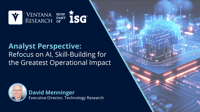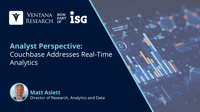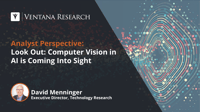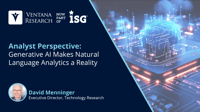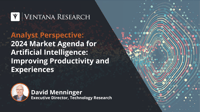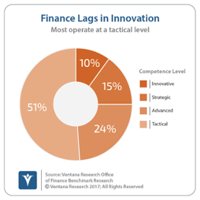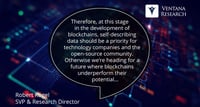In the technology industry, 2023 will be remembered as the year of generative artificial intelligence. Yes, the world was made aware of GenAI when ChatGPT was publicly launched in November of 2022, but few knew the impact it would have at that point in time. Since then, GenAI has taken the world by storm, with vendors applying the technology to make it easier to ask questions about data, write code (including SQL), prepare data for analyses, document data pipelines and use software products...
Read More
Topics:
Artificial intelligence,
Analytics & Data,
Generative AI,
AI and Machine Learning,
Model Building and Large Language Models
I have previously written about the impact of intelligent operational applications on the requirements for data platforms. Intelligent applications are used to run the business but also deliver personalization, recommendations and other features generated by machine learning and artificial intelligence. As such, they require a combination of operational and analytic processing functionality. The emergence of these intelligent applications does not eradicate the need for separate analysis of...
Read More
Topics:
Analytics,
Artificial intelligence,
data platforms,
Analytics & Data,
Generative AI,
AI and Machine Learning
Unstructured data has been a significant factor in data lakes and analytics for some time. Twelve years ago, nearly a third of enterprises were working with large amounts of unstructured data. As I’ve pointed out previously, unstructured data is really a misnomer. The data is structured; it's just not structured into rows and columns that fit neatly into a relational table like much of the other information enterprises process. Consequently, it requires different skills, different technology...
Read More
Topics:
Artificial intelligence,
Analytics & Data,
AI and Machine Learning,
Computer Vision
We’ve been saying for years that natural language processing (NLP) and natural language analytics would greatly expand access to analytics. However, prior to the explosion of generative AI (GenAI), software providers had struggled to bring robust natural language capabilities to market. It required considerable manual effort. Many analytics providers had introduced natural language capabilities, but they didn’t really resonate with enterprise requirements. They required significant effort to...
Read More
Topics:
business intelligence,
Artificial intelligence,
natural language processing,
Analytics & Data,
AI and Machine Learning,
GenAI
Ventana Research recently announced its 2024 Market Agenda for Artificial Intelligence, continuing the guidance we have offered for two decades to help enterprises derive optimal value from technology and improve business outcomes.
Read More
Topics:
Artificial intelligence,
natural language processing,
Generative AI,
Computer Vision,
Model Building and Large Language Models,
Deep Learning
Roughly half of my more than 30-year career in human capital management was spent as a line manager responsible for HR technology strategy, selection and deployment. I learned a number of lessons during these years — some just in time, some after the fact. If I had to identify one common thread that unites these insights, it would be that inadequate attention to change management is an ROI-killer on these strategic initiatives every time.
Read More
Topics:
Human Capital Management,
Learning Management,
Analytics,
Workforce Management,
Digital Technology,
Artificial intelligence,
Total Compensation Management,
Continuous Payroll
Learning management technology, either as part of a larger HCM software suite or as a standalone niche solution, has evolved from its classroom-based, instructor-led origins. Modern systems deliver information the way many employees learn best, through informal social learning that is personalized and engaging. Some of these new, often mobile-enabled approaches deliver education via short (three to five minute) on-demand videos that are tailored to an individual’s specific job responsibilities...
Read More
Topics:
Human Capital Management,
Learning Management,
HRMS,
Workforce Management,
Digital Technology,
Work and Resource Management,
Machine Learning and Cognitive Computing,
Artificial intelligence,
employee experience,
Chatbots,
Personalization,
Predictive HCM
The early days of my career were spent in HR and payroll systems inside brokerage houses and investment banks. The first CHRO I reported to thought the best way to develop a plan for automating payroll management was for me to run the function’s day-to-day operations. I had no previous experience in payroll but it was a good call, as the trenches of any operations area typically reveal a cornucopia of automation opportunities. Then again, it was a different time; back then the words strategy,...
Read More
Topics:
Human Capital Management,
HRMS,
Workforce Management,
Digital Technology,
Work and Resource Management,
Machine Learning and Cognitive Computing,
Payroll Optimization,
Artificial intelligence,
Total Compensation Management,
RPA,
employee experience,
Chatbots,
Personalization,
Predictive HCM
After more than a decade of steady development, ERP systems today are changing fundamentally, facilitated by the availability of advances such as cloud computing, advanced database architecture, collaboration, improved user-interface design, mobility, analytics and planning. This was evident when Oracle recently held its third analysts-only ERP Cloud Summit in New York to coincide with its Modern Finance Experience event. Oracle now has an increasingly robust set of business applications that...
Read More
Topics:
ERP,
Machine Learning,
Cloud Computing,
Robotic Process Automation,
Artificial intelligence,
blockchain,
AI
SAP recently held a teleconference to highlight its blockchain strategy. Lately, the major business software vendors have been calling attention to their blockchain initiatives. While the focus on this technology might seem premature to those who still equate it with cryptocurrencies, evidence is pointing to a future pace of adoption similar to the rapid take-up of the internet in the 1990s. That blockchain is useful for a wide range of business functions isn’t news – just google “blockchain...
Read More
Topics:
Machine Learning,
Office of Finance,
finance transformation,
Robotic Process Automation,
Artificial intelligence,
blockchain,
AI,
bots,
robotic finance
